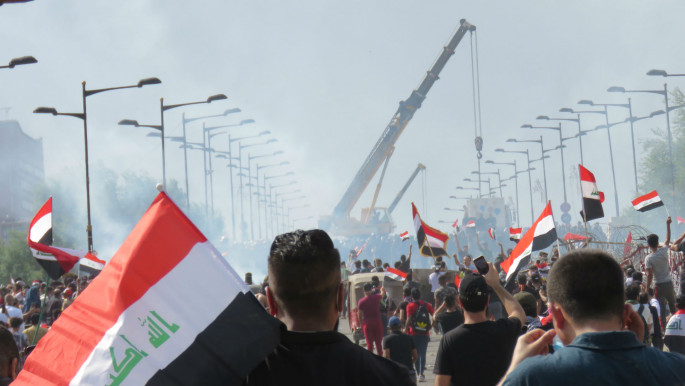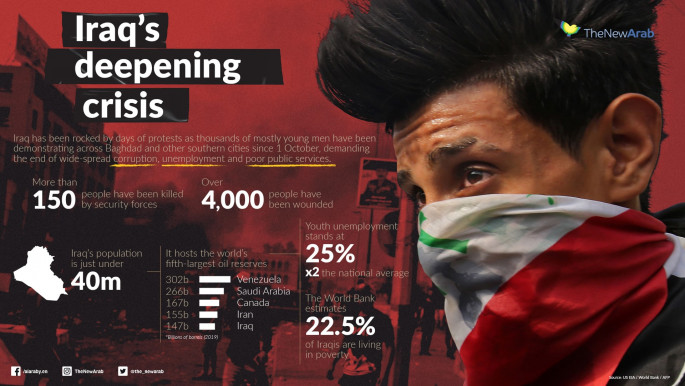Desperate Iraqi youth renew protests in unyielding attempt to reclaim their homeland
Men, women and even children from all walks of life have marched to Baghdad’s Tahrir square since the early hours of the morning. But it was not the mere absence of basic services and human rights that stimulated their rage - this time it was a sheer will to overthrow a sectarian political system begotten by a foreign invasion, lacking capability and even willingness – in the eyes of Iraqis – for acting upon the interest of the citizenry.
"All the boys in my neighbourhood have joined the demonstration – why should I stay?" a young boy of about eight years old told me as he made his way to Jawad Salim’s Freedom Monument, where thousands have already gathered, chanting anti-government slogans, and sometimes anti-Iran, whose sway on Iraq’s political and economic scenes has transformed the everyday life of millions into a challenge.
Pushback
During the night, just hours after Interior Minister Yassine al-Yaseri posted on twitter pictures of himself posing with protesters at Tahrir, vowing protection for them, videos flooded social media pages with protesters who crossed al-Jumhouriyah bridge in an attempt to break into the Green Zone – where foreign embassies and government offices are located – being met with scalding water cannons and tear gas.
 |
All the boys in my neighbourhood have joined the demonstration – why should I stay? |  |
By the time I reached the square after being checked by security forces on one of its entrances at around 10 AM, riot police were leaps and bounds blanketing the entrance of al-Jumhouriyah bridge with tear gas, with tuk-tuk drivers stepping up to the task, rushing to assist ambulances in transferring the abundant numbers of casualties to over-crowded hospitals.
Undepletable ammunition seemed to be at the disposal of security forces, who relentlessly fired tear gas during the five hours or so that I was present at the square, repeatedly pushing the protesters back to Tahrir square with scores of injured people frantically carried out in ambulances or tuk-tuks to safety.
 |
|
| Young Iraqis resumed anti-government protests on October 25 [Nabil Salih] |
Unarmed, peaceful protesters dodged volleys of tear gas canisters as they landed among crowds of resilient young men, dancing and singing in festive mood alongside old women who wore black Abaya dresses and raised their fists in defiance to the repression of authorities under intermittent bouts of rain – unshaken by the loud bangs of stun grenades.
Volunteers roamed the square to offer food and drinking water, others carried bottles of Pepsi to heal tear gas injuries - the generosity and kindness of Iraqis embodied in the simple yet significant acts of individuals. At one instance, I lost my vision and fell unconscious to the ground after being hit by tear gas alongside a group of protesters and three colleagues. Protesters rushed to the rescue carrying the other journalists to ambulances and providing first aid to me.
I was numb, overwhelmed and desperately trying to hold my tears as I meandered the square among dozens of thousands of protesters unified under the Iraqi flag, voicing their refusal to each and every political party that has contributed in plunging Iraqis in an endless sea of death, misery and deprivation.
According to Ali al-Bayati, member of the Iraqi Independent High Commission for Human Rights (IHCHR), 42 people were killed in one day, and over 2000 were wounded.
 |
At one instance, I lost my vision and fell unconscious to the ground after being hit alongside a group of protesters |  |
The high casualty number reflected what one analyst told me on condition of anonymity for fear of reprisal: "It resembled an aforethought intention to put off a spontaneous movement that represented a wakeup call to Iraqis from all sects and religions pointing out the influence of Iran and the US, the two puppeteers having the last say on most of Iraq’s political moves."
Broken promises
At Tahrir square, protesters decried what they called an increasing interference of foreign powers in Iraq’s affairs.
Meanwhile in the country’s south, dozens of offices belonging to political parties that have armed wings were set on fire in a scene that the analyst said represented a deepening sense of distrust towards Iraq's political elite.
"The distrust and widening rift between the average people and the leaders of these parties, whose members grow wealthier at the expense of ordinary people to whom they have failed to provide the simplest necessities of life," the analyst said.

The crackdown on Friday also contradicted repeated promises made by politicians for the protection of people’s right to protest, as security members at Tahrir square and protesters alike suffered suffocation from tear gas. "Everyone promised to protect them, but we’re seeing the absolute opposite," a young volunteer medic poignantly told me.
In the buildup to Friday’s renewed protests, numerous speeches were made by Iraqi leaders pledging to scale up their fight against corruption, improve living standards and hold those who previously assaulted civilians and security members accountable.
But locals - sick and tired of empty promises and aware of the embarrassing capacity of Iraqi institutions - doubted any of the presented reforms will be implemented. "People want to overthrow the regime!" they chanted.
However, what remains to be fascinating is the sheer persistence of Iraq's young protesters, many of which have suffered from systematic negligence and marginalisation for the entirety of their lives.
Despite the violent response of authorities and "unidentified" gunmen slaughtering protesters, thousands of Iraqis continue to dance their sorrows away while dreaming of a dignified life unmarred by humiliation and injustice.
Follow us on Twitter and Instagram to stay connected





 Follow the Middle East's top stories in English at The New Arab on Google News
Follow the Middle East's top stories in English at The New Arab on Google News


